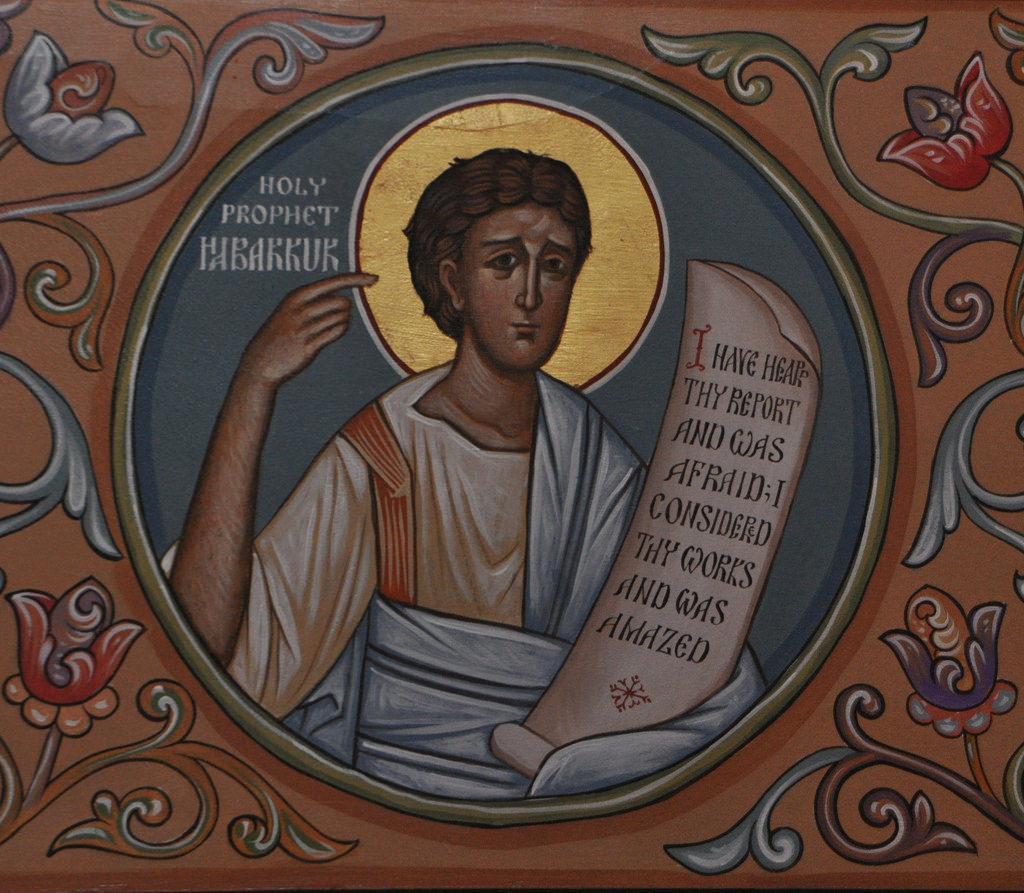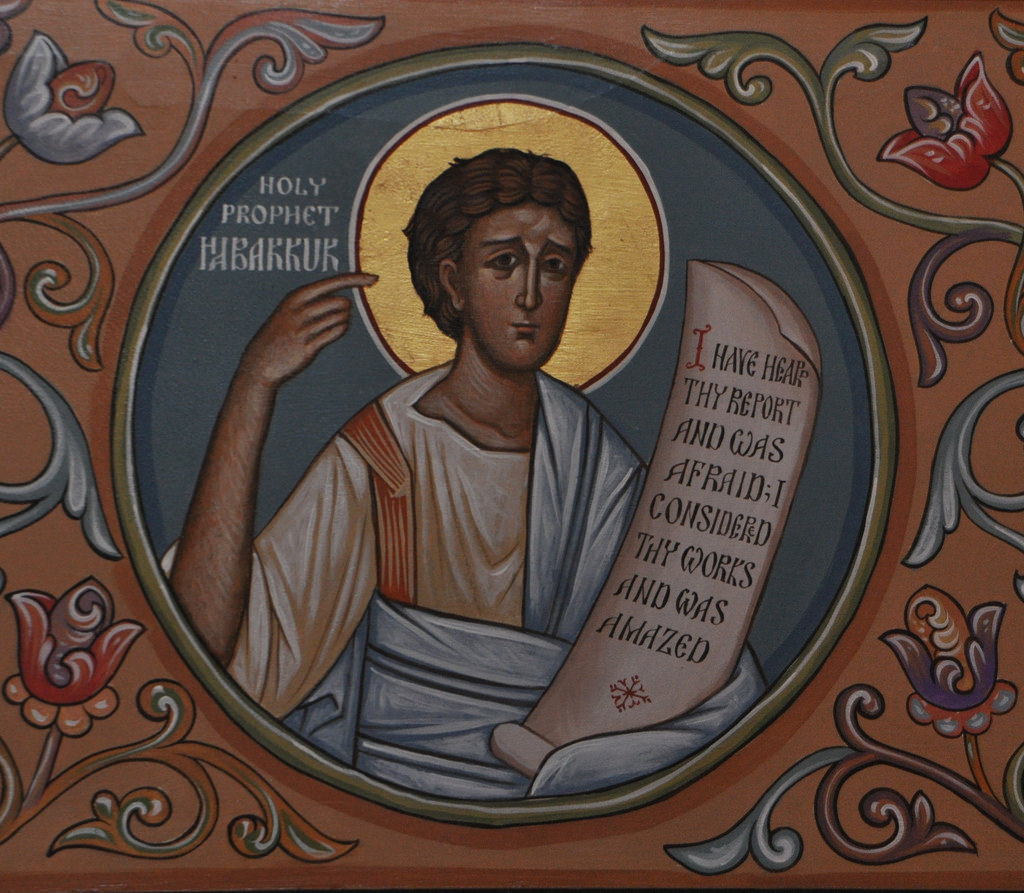
Habakkuk
Habakkuk 1:1-4, 2:2-4, 3:17-19
Monday–Habakkuk
“O Lord, how long shall I cry for help, and you will not listen” (Habakkuk 1:1)?
Ken opened the letter. It began, “We regret to inform you …” Ken had been praying and looking for a job for months, and this was another turn down. Ignacio and Amelia prayed many times a day for their son Eduardo. He had turned away from God, from them and was making many bad choices. Katelynn prayed that her grandfather’s cancer would go into remission, but it only seemed to be getting worse. The question asked by all of these people was, “Why doesn’t God answer?”
All of us have been it that same position. Habakkuk lived 2,600 years ago and he spoke the exact same words. Like Habakkuk, many of us get angry at God. Others try to rationalize God’s silence thinking that God might be answering their prayers with a “wait,” or a “no.” Some people even give up and stop praying convinced that God doesn’t care.
One of the most difficult lessons to learn about prayer is that it is not a way that we bend God’s will into our own. The situation may be beyond our control and we may know what we want to happen. God, though, doesn’t need our instructions or advice. Instead, prayer is an opportunity for us to enter into God’s presence and place our cares and concerns at God’s feet. We can then leave our places and times of prayer at peace, rejoicing that God is with us and that our cares and concerns are where they need to be.
Loving God, there are times that you are so silent. Help us to understand that your silence is not a sign of abandonment and to rejoice that our lives and those of our loved ones are in your hands. Amen.
Tuesday–Habakkuk
“Destruction and violence are before me: strife and contention arise” (Habakkuk 1:3).
In the Middle East Isis is slaughtering innocents in the name of God. Violence simmers just under the surface in many towns and cities. One child in five goes through life with growling stomach and malnourished body. People are digging out from under the storm of the century. We can identify with what Habakkuk is seeing and feeling when he says, “Destruction and violence are before me.”
Though distant, these situations are in our prayers. We know that the Holy Spirit can move and ease the pain, supply needs, give comfort, strengthen faith and inspire hope. We wait for God to move.
In the meantime, we don’t need to stand around with our hands in our pockets. We can take action. We can plan fundraisers, give to relief organizations, volunteer to serve in local service ministries, or act in a multitude of ways. We never know how we may be an answer to our own prayers.
God of power and might, use us to serve our neighbors and be an answer to their prayers. Amen.
Wednesday–Habakkuk
“For there is still a vision … If it seems to tarry wait for it, it will surely come, it will not delay” (Habakkuk 2:3).
I had some software problems last week. The app wouldn’t update and sync correctly. I had a tech guy from Apple on the phone for an hour. We’d take one step and then wait for the computer. The little circle icon would go around and around on the screen but nothing would happen on the progress bar. After ten minutes we checked the task manager to see if the program was “not responding.” The task manager indicated that the program was still running. After fifteen minutes a little green marker appeared on the left side of the progress bar. It moved slowly to the right. The tech guy told me not to worry and to wait patiently. He said, “The computer was working hard, it just had a lot of work to do.”
This statement could be just as true in our walk of faith. We pray and we become impatient when God doesn’t answer our prayers in a timely manner. The Lord may be moving mightily in the background, though, where we can’t see. The thing is we don’t have a little circle going round and round, or a task progress bar to assure us that God is indeed working. That may be why the life of a disciple requires faith and patience.
Almighty God, forgive our impatience. Help us to be patient with you in the same manner that you are patient with us. Amen.
Thursday–Habakkuk
“Look at the proud! Their spirit is not right in them, but the righteous live by faith” (Habakkuk 2:4).
Today is our official day of Thanksgiving. We’ve come a long way from that first thanksgiving meal that the Pilgrims shared with their Native American neighbors. They were thankful merely for seeing the light of another day. Today our giving thanks is woven between huge meals, naps, afternoon football, “A Charlie Brown Thanksgiving” and preparing for Black Friday.
Our words of thanks usually take on two forms. Many times we give thanks for what we HAVE. We are thankful for our jobs, our positions in the companies, our houses, our families, the vacations that we have taken and the items we have accumulated. At the same time that we are thankful we are also proud. We have worked hard for what we have. Along with being thankful and proud, we are also fearful that we might lose what we have acquired.
We can also be thankful for what we have RECEIVED. We may give thanks for the same items, but we understand that what we have are gifts. Our jobs, positions in the companies, our houses, our families and all the rest are gifts given to us by a gracious and loving God. We are thankful and instead of being proud are humbled by God’s generosity in our lives. We never need to be fearful because our attention is not focused on the gifts but on the giver. Such is the life of faith.
God of abundance, we are truly thankful for the abundance that you have poured into our lives. May our thankfulness not be contained to this day, but may it be a part of every moment of our lives. Amen.
Friday-Habakkuk
“Though the fig tree does not blossom and no fruit is on the vines” (Habakkuk 3:17).
Subtle changes have taken place in the life of the prophet Habakkuk. In chapter one of his book he observes signs of God’s stillness and he is angry. God isn’t moving fast enough for him. Habakkuk even wonders if God has heard him or is doing anything. Doubt floods his mind—maybe God can’t do anything.
Two chapters later Habakkuk again sees signs that God has not yet acted to save the people of God. The fig tree still isn’t blooming and there isn’t any fruit, yet, on the vines. Now, though, Habakkuk is patient. The signs of God’s inactivity are not where he focuses his attention. Habakkuk looks beyond them to see a loving and powerful God.
Physical signs of God’s movement, or the lack of them, are not reliable indicators of God’s presence and movement. Only a trust in God’s steadfast love and overwhelming grace can inspire us to live with hope throughout the day.
Faithful God, in the storms of life help us keep our eyes on you rather than the waves. If we falter and look away, grab our hands so we do not sink. Amen.
Saturday–Habakkuk
“Yet I will rejoice in the Lord” (Habakkuk 3:18).
People wait differently. Some people bury their noses in their cell phones and play games, answer emails or text their friends. A noticeable minority stand quietly and patiently unconcerned with the passage of time. Still others pace back and forth, grumble and show everyone around them that they are upset.
We can choose how we wait on the Lord. We can look around us and point out all the wrongs of the world and all the indications that God is not moving. We can complain that God doesn’t hear us, or love us. We can wonder if the situation is too great for God’s power and challenge God to show us that God is up to the task.
We can also choose to rejoice in the Lord while we wait. We can thank God for life and health. We can rejoice at God’s care and provision for us. We can be grateful for God’s steadfast love, unconditional forgiveness and overwhelming grace.
Which choice demonstrates the relationship with God that we have?
Gracious God, move within us so that our lives might bear witness to your greatness with a consistent attitude of gratitude. Amen.
Sunday–Habakkuk
“God the Lord is my strength. He makes my feet like the feet of a deer and makes me tread upon the heights” (Habakkuk 3:19).
The prophet Habakkuk and traveled a far journey. He started his writing by complaining that God wasn’t doing anything and questioning God’s power and love. By the end of his book, Habakkuk is proclaiming that God is his strength and his feet are like those of a deer. Habakkuk is able to make these assertions of faith even though the situation that he is in hasn’t changed. Habakkuk is the one who has changed.
Habakkuk’s words are reflected in the words of a popular song:
- When I am down, and, oh, my soul, so weary
When troubles come, and my heart burdened be
Then, I am still and wait here in the silence
Until you come and sit awhile with me
- [Chorus]
You raise me up, so I can stand on mountains
You raise me up to walk on stormy seas
I am strong when I am on your shoulders
You raise me up to more than I can be
- There is no life, no life without its hunger
Each restless heart beats so imperfectly
But then you come, and I am filled with wonder
Sometimes I think I glimpse eternity
- Songwriters: LOVLAND, ROLF U. / GRAHAM, BRENDAN
© Universal Music Publishing Group
Precious Lord, Inspire hope within us and lift us up so that we may shine brightly for you. Amen.

